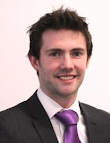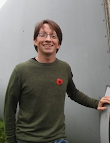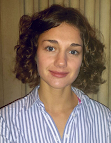Research students: REMS 2019
 Jonathan White
Jonathan White
Biography: Jonathan White is a Geotechnical Engineer with a particular interest in seismic design. He studied for an MEng in Civil and Structural Engineering from the University of Leeds, and more recently completed an MSc DIC in Soil Mechanics and Engineering Seismology at Imperial College London. Before joining the REMS CDT, he spent almost five years working as a geotechnical engineer for Royal HaskoningDHV in their Maritime & Waterways business line, where he was involved in a number of large port and land reclamation projects. His work has primarily focused on ground characterisation and the design of ground improvement solutions in challenging, soft soil environments. His research interests lie in the performance and soil-structure interaction of driven piles subjected to dynamic loading.
Current employer: Ørsted
Position: Senior Geotechnical Engineer
Thesis title: A Laboratory Investigation into the Behaviour of Sand at Low Stresses
Project description: Offshore wind turbine foundations, such as a monopile, can be analysed using numerical modelling techniques, e.g. the finite element analysis technique. Such methods require the definition of an appropriate constitutive model, and these are relatively well defined for clays but less so for sands, particularly at low stress levels. This research has therefore explored the behaviour of sand in the triaxial apparatus, at low stress level, subjected to a range of stress path and cyclic loading histories. The results of the testing has been used to validate both new and existing constitutive models, including those currently under development at Oxford.
Academic supervisors: Prof Guy Houlsby, Prof Chris Martin
Industrial supervisor: Mike Rattley (Fugro)
 Victor Igwemezie
Victor Igwemezie
Biography: Victor Chinedu Igwemezie is a Metallurgical Engineer with special interest in phase transformation, welding metallurgy, fracture mechanics and corrosion control, of steel. He obtained his B. Eng and M. Eng in Metallurgical Engineering from Federal University of Technology, Owerri, Nigeria. Before joining the REMS-CDT, he worked with the above named university in the Department of Materials and Metallurgical Engineering where he assisted in the teaching of Mechanical Properties of steel, Failure of steel and Analysis, Heat treatment of steel and Introduction to non-ferrous alloy for the undergraduates. His research area in REMS-CDT was in understanding the effect of microstructure and corrosion on the crack growth and fracture behaviour in the steel used in the design of renewable energy marine structures.
Current employer: Cranfield University
Position: Research Fellow
Thesis title: Corrosion Fatigue in Marine Structures
Project description: Wind turbine support structures are exposed to high cyclic loading caused by wind and normal operation. The fatigue loading histories are diverse, ranging from simple to repetitive and completely random. Reliable prediction of wind turbine lifespan and determination of cause of a fatigue failure require a comprehensive understanding of material properties and behaviour, mechanical loading conditions, and environmental factors. This project was aimed at providing guidance on inspection requirements and prediction of corrosion fatigue life of offshore structures designed with S355 steel, particularly with S355G10+M. The results obtained from this project have improved and expanded the existing knowledge on the extent of corrosion fatigue crack growth rates in offshore wind turbine support structure made with S355 steel within narrow band of frequencies.
Academic supervisors: Prof Ali Mehmanparast, Prof Feargal Brennan
 Anaïs Jacob
Anaïs Jacob
Biography: Anais is a Mechanical Engineer with a special interest in Structural Integrity assessment of renewable energy marine structures. Anais received her double MSc diploma from both Supmeca Paris (Institut Superieur de Mecanique) and Cranfield University in 2015. During her studies she had the opportunity to work within Airbus France, Maintenance and Industrial Systems department; and Rolls-Royce Deutschland, Compressor Development department. Anais was a member of the second cohort of the REMS CDT Programme and her research interest was primarily the assessment of the influence of the residual stresses on the structural integrity assessment of renewable energy marine structures.
Current employer: Bureau Schroeder & Associés S.A.
Position: Engineering Risk Manager
Thesis title: The influence of residual stresses on structural integrity of renewable energy marine structures
Project description: Offshore wind turbine foundations need to be structurally optimised. The aim of the project was to assess the influence of residual stresses on fatigue, fracture mechanics and structural integrity of offshore wind turbine structures. Moreover, the assessment of how residual stresses interact under variable fatigue loading amplitudes both in air and free corrosion environment were performed and consequently near threshold crack propagation behaviour of wind turbine structures were examined. The study focused mainly on welded components and provided an understanding of residual stress levels and their redistribution behaviour in large scale welded components. Neutron diffraction measurements and numerical finite element techniques were employed in this research to reduce the effect of damaging residual stresses in offshore wind monopile structure.
Academic supervisors: Prof Ali Mehmanparast, Prof Feargal Brennan
Industrial supervisor: Dr Joe Kelleher (STFC)
 Russell Mayall
Russell Mayall
Biography: Russell Mayall is a Geotechnical Engineer with five years’ experience working in the offshore sector. Russell graduated with an MEng (Hons) in Civil and Structural Engineering from The University of Sheffield. After graduating Russell worked in the offshore geotechnical consultancy department at Fugro GeoConsulting Limited. His experience at Fugro includes performing foundation design projects for the offshore market, offshore work on geotechnical site investigations, and secondments to other Fugro offices. Russell was a University of Oxford Research Engineer in the second cohort of the REMS CDT. He researched the interaction between seabed scour, scour protection, and offshore wind turbine foundations. Russell was enrolled on the DEng program at Oxford, with support from E.ON and HR Wallingford.
Current employer: RWE Renewables
Position: Foundations Engineer
Thesis title: Monopile response to scour and scour protection
Project description: Placement of offshore wind turbine foundations on the seabed affects the fluid velocity regime in the vicinity of the structures, which can lead to the development of global and local scour of the seabed sediments. Observation and monitoring of installed structures has shown that the natural frequency of the structure is affected by the development of such scour. Scour protection can be used to mitigate or remediate scour problems, however there is a limited understanding of how scour protection interacts with the integrated structure-foundation response. The purpose of this DEng research project was to investigate the effects of scour and scour protection on the foundation response, and to develop rational guidance on how this might be incorporated into the foundation and structural model. The research included small and large scale experiments, numerical modelling, and analysis of field measurements for the purposes of calibrating the models developed.
Academic supervisors: Prof Byron Byrne, Prof Harvey Burd
Industrial supervisors: Phillipa Slater (E.On), Steve Heald (E.On), Prof Richard Whitehouse (HR Wallingford)
 Matti Scheu
Matti Scheu
Biography: Matti Scheu is a Mechanical Engineer focused on structural design and asset management topics in the field of offshore wind energy. Matti previously worked for the Denmark-based international consultancy company Ramboll representing their Wind and Towers Asset Management Group as a lead. Focusing on development and implementation of Reliability Centred Maintenance (RCM) approaches in his industrial projects, his research project tackled the field of decision making under uncertainty at the example of offshore wind assets, attempting to embed risk considerations in the right context with a strong focus on industrial applicability.
Current employer: PEAK Wind ApS
Position: Lead Consultant / Head of OPEX and O&M Concepts
Thesis title: Structural Reliability of Offshore Wind Assets
Project description: This research has considered methodologies and technologies currently available for effective risk informed life-cycle management of offshore wind farms and examined ways in which these can be developed and refined for improved performance. Particular attention has been paid to quantifying uncertainty of input parameters and the associated confidence in life predictions; as a first step, methods were developed to allow the examination at a general level of the effect of equipment reliability and uncertainty on expected asset performance. Detailed investigations focusing on coping with margins and uncertainties in structural asset integrity were then approached with the overall objective to identify, develop and verify methods to achieve a balance between project risks, asset performance and profitability.
Academic supervisors: Prof Feargal Brennan, Prof Athanasios Kolios
Industrial supervisor: Tim Fischer (Ramboll Wind and Towers)
 Dawn Ward
Dawn Ward
Biography: Dawn classes herself as an anti-speciesist, an environmentalist and a Renewable Energy Engineer. She has a Bachelor of Mechanical Engineering with 1st class honours from Nottingham Trent University and an MSc in Renewable Energy Systems Technology with Distinction from Loughborough University, made possible by a financial award of £7,000 from the Royal Academy of Engineering. She has worked as a designer of tidal energy devices and was manager of the Wind Turbine Blade Testing Facility at the New and Renewable Energy Centre (NaREC), during the final part of the facility’s commissioning and initial commercial phases. She has also worked within the ‘Green Buildings’ sector both as a consultant and as a ‘hands-on’ engineer.
Current employer: Hope Valley Climate Action
Position: Renewables Project Officer
Thesis title: Reducing Tower Fatigue through Blade Back Twist for a Pitch-to-Stall FOWT
Project description: Further expansion of the industry will require it to embrace floating offshore wind turbine (FOWT) solutions in the near future.
To make floating wind turbines more economically viable, ways to reduce loads on the structure, such as higher oscillations caused by wind and wave loadings, would allow reductions in the structural requirements and hence costs and therefore an overall increase in attainable profits.
The initial requirements were to build an aero-hydro-servo-elastic coupled model of the dynamics of a complete floating wind turbine. This simulation therefore represented the wind, sea, control system and structural dynamic model, where the structural model considered the mooring method, floating platform and main wind turbine, such as the rotor, nacelle and tower.
This was then be used to analyse loadings seen on the structure under different control models, both active and passive, including the drive train, allowing novel controlled approaches in load reduction.
The final aim was the proposal of a novel control system or strategy, through state-of-the art numerical tools, and assessed both from a technical and an economical point of view.
Academic supervisors: Dr Joy Sumner, Prof Maurizio Collu
 lona Richards
lona Richards
Biography: Iona is a Civil Engineer who is particularly interested in geotechnics and renewable energy. Before joining the REMS CDT Iona obtained a MEng (Hons) in Engineering Science from Oxford University, where she was awarded the ICE Student Prize and the BGA MSc Prize for her Master’s project entitled “Time and rate effects for laterally loaded driven piles in clays”. Her research interests lie in optimising the design of foundations for offshore wind. Iona was an EPSRC funded student enrolled on the DPhil program at Oxford.
Current employer: Wood Thilsted Partners Limited
Position: Geotechnical Engineer
Thesis title: Response of a Monopile to Complex Cyclic Lateral Loading in Dry Sand
Project description: Iona’s project explored the response of monopile foundations subject to cyclic lateral loading using scaled model testing. A new test rig is was developed, which allowed the effects of multi-directional loading to be investigated. The work was interpreted through recent theoretical developments within the hyperplasticity framework.
Academic supervisors: Prof Byron Byrne, Prof Guy Houlsby
 Paul Causon
Paul Causon
Biography: Paul Causon is a marine ecologist with a particular interest in population dynamics. After graduating with an MRes in environmental biology from St Andrews University, Paul spent 6 years in environmental consultancy. As part of the REMS doctoral program, Paul’s research was focussed on interactions between marine organisms and offshore wind turbines.
Current employer: Self-employed
Position: Marine Ecologist
Thesis title: An assessment of natural capital at Thanet offshore wind farm
Project description: The growth of marine organisms on wind turbine foundations has the potential to alter the hydrodynamic loading, structural response and fatigue of offshore wind support structures. Through modelling variability in colonisation, as a result of structural features, seasonality and geographical location, coupled with tank tests on physical scale models, the project aimed to better understand long-term effects of colonisation on structural fatigue damage.
Academic supervisors: Prof Paul Leinster, Prof Feargal Brennan

